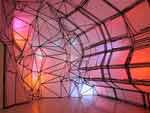Ping-Pong Diplomacy
dal 10/3/2006 al 13/5/2006
Segnalato da
10/3/2006
Ping-Pong Diplomacy
Kemper Museum of Contemporary Art, Kansas City
Stephen Hendee and Phoebe Washburn

Stephen Hendee and Phoebe Washburn
An upcoming exhibition at the Kemper Museum of Contemporary Art takes a closer look at how two emerging artists use low-tech, common materials to create larger-than life sculptural environments that fuse together architecture and landscape and playfully negotiate different aesthetics. Ping-Pong Diplomacy: Stephen Hendee and Phoebe Washburn, on view March 11-May 14 at the Kemper Museum, features two major site-specific installations by Stephen Hendee and Phoebe Washburn, and includes a ping-pong table designed in tandem by both artists located at the center of the gallery, where visitors can reflect on the exhibition’s duality while playing a game or two.
Taking a historic 1971 table tennis tournament as its point of reference, Ping-Pong Diplomacy explores the idea of working out differences through play by bringing together two artists who follow similar rules to express divergent styles and concepts. Stephen Hendee, who is based in Las Vegas, uses simple materials like corrugated plastic sheets, photo tape, fluorescent lights, and hot glue to create multi-faceted, glowing, geometric landscapes that summon comparisons to the stage sets of science-fiction films, like the 1982 cult classic Tron. While the ambiance is one of virtual reality and cyberspace, Hendee’s otherworldly forms shape interiors in a way that is strangely organic—the geometry of his works move and bend in unexpected and spontaneous ways, like rock formations. Additionally, his surfaces are often disrupted by zigzagging lines of black tape that mirror the tangled topography of highways and inspire associations with the unchecked growth of
Similarly, Phoebe Washburn, a New York-based artist, also comments on urban sprawl by composing works with post-consumerist materials she discovers and collects from loading docks, alleyways, and dumpsters. Using these seemingly basic materials that reflect a society of excess, Washburn creates intricate, tumbling architectural landscapes fused together in a way that is disjointed, random, and largely improvisational. Considering herself an “anti-builder builder," Washburn aligns her practice with that of “spontaneous architecture," a loosely defined type of construction that makes use of whatever materials are at hand (or can be scrounged up) and then put to use in inventive ways. Washburn has cited shantytowns as an inspiration for her inventive, chaotic terrestrial formations, which often include living, growing plants among the debris-strewn topography.
While both Hendee and Washburn rely on basic materials and subtly comment on significant social and geo-political issues, they also bring together two very distinct aesthetics. “Hendee and Washburn pursue much different ‘deliveries’—at the most basic level, Hendee’s works are graceful, restrained, seductive, and ethereal, while Washburn’s are clumsy, impulsive, awkward, and terrestrial. Seen together occupying a single space ... their respective works suggest the meeting of heaven and earth," Kemper Museum curator Elizabeth Dunbar writes in her exhibition essay.
Hendee and Washburn are visiting artists at the Kemper Museum. A brochure, including Dunbar’s essay and a dialogue between the artists, accompanies the exhibition.
Kemper Museum of Contemporary Art
4420 Warwick Boulevard Kansas City, Missouri 64111
Open Tues.-Thurs. 10-4, Fri.-Sat. 10-9, Sun. 11-5
Free admission and parking



